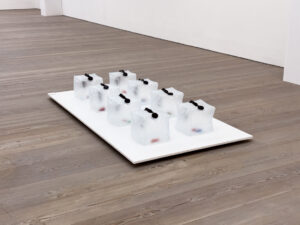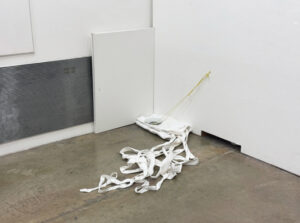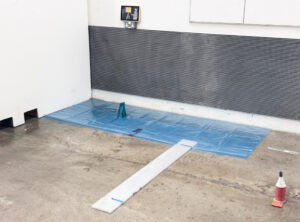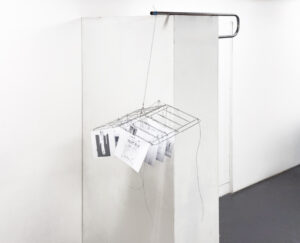Jichi Zhang
Jichi Zhang: The Poetics of Ephemerality
by Anna Gvozdeva
Jichi Zhang’s practice transforms industrial detritus—plastic sheeting, packaging materials, discarded ephemera—into meditations on impermanence. His works exist in liminal states, where materials hover between form and decay, presence and absence. Rather than imposing rigid structures, Zhang collaborates with his mediums, allowing their inherent qualities—wrinkles that soften, surfaces that shift—to guide each piece’s evolution.
 Jichi Zhang | Backroom, leben | 2024
Jichi Zhang | Backroom, leben | 2024
The am series (2025) epitomizes this philosophy. Stripping the verb “to be” to its barest form, these installations embody suspended states of existence. Like plastic sheeting trembling in an unseen draft, they celebrate transience as a generative force. Similarly, Backroom, leben (2024) encases mechanical fish in plastic—a poignant commentary on preservation and obsolescence that avoids didacticism through material poetry.
 Jichi Zhang | Pre-am | 2025
Jichi Zhang | Pre-am | 2025
Zhang’s site-responsive installations (Pre-am, Under-am) demonstrate remarkable spatial sensitivity. They don’t occupy space so much as converse with it—activated by light, air currents, and viewer proximity. This creates an intimate viewing experience antithetical to today’s spectacle-driven art world.
 Jichi Zhang | Under-am | 2025
Jichi Zhang | Under-am | 2025
Historical consciousness permeates works like Grounded (2024), where archival documents confront barbed wire. Yet Zhang’s approach remains resolutely material-first—the politics emerge through textures and tensions rather than explicit statements.
 Jichi Zhang | Grounded | 2024
Jichi Zhang | Grounded | 2024
Educated at Central Saint Martins and the Slade, with exhibitions from Saatchi to the Louvre, Zhang represents a vital countercurrent in contemporary art—one that privileges fragility over monumentality, asking viewers to slow down and sit with uncertainty. His is an art of quiet persistence, where disappearance becomes its own form of staying.

Leave a Reply
You must be logged in to post a comment.